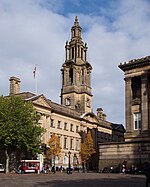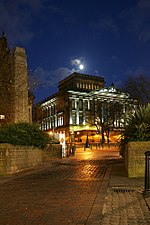City of Preston, Lancashire

Preston ( ), commonly known as the City of Preston, is a local government district with city status in Lancashire, England. It lies on the north bank of the River Ribble and has a population of 147,617 (2021). The neighbouring districts are Ribble Valley, South Ribble, Fylde and Wyre. The district is named after its largest settlement, Preston, which lies in the south of the district. The district also includes rural areas to the north of the main urban area, including part of the Forest of Bowland, a designated Area of Outstanding Natural Beauty. In 2002 the district was granted city status to mark the Golden Jubilee of Elizabeth II; prior to this it was known as the Borough of Preston, having held borough status since its creation in 1974.
Excerpt from the Wikipedia article City of Preston, Lancashire (License: CC BY-SA 3.0, Authors, Images).City of Preston, Lancashire
Market Square, Preston Avenham
Geographical coordinates (GPS) Address Nearby Places Show on map
Geographical coordinates (GPS)
| Latitude | Longitude |
|---|---|
| N 53.759 ° | E -2.699 ° |
Address
Market Square
Market Square
Preston, Avenham
England, United Kingdom
Open on Google Maps










